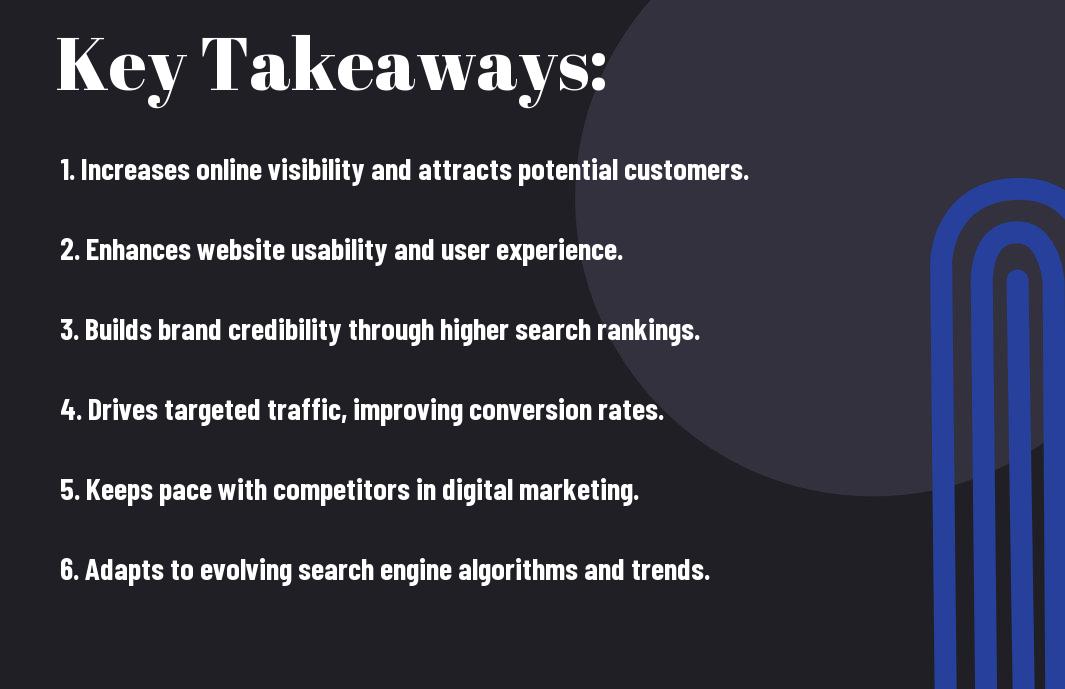With the ever-evolving digital landscape, comprehensive search engine optimization (SEO) has become important for small businesses seeking growth and sustainability. Without effective SEO, your business risks being overshadowed by competitors, limiting your visibility and potential customer base. By investing in robust SEO practices, you can enhance your online presence, attract targeted traffic, and ultimately boost your sales and long-term success. Embracing an effective SEO strategy not only helps you connect with your audience but also establishes your brand as a credible and enduring player in the market.
Key Takeaways:
- Effective SEO enhances online visibility, helping small businesses reach a wider audience and attract potential customers consistently over time.
- Implementing a solid SEO strategy aids in building brand credibility, fostering trust among consumers who often rely on search engine results to evaluate businesses.
- Ongoing optimization helps small businesses stay competitive in their market, adapting to changing algorithms and consumer behaviors to maintain their relevance.

Understanding Search Engine Optimization
Your grasp of Search Engine Optimization (SEO) can significantly influence your business’s online visibility. By enhancing how your website appears on search engines, you attract more potential customers and create a strong digital presence. This foundational knowledge is vital for ensuring your business thrives in an increasingly competitive marketplace.
What is SEO?
An effective SEO strategy encompasses techniques that improve your website’s visibility in search engine results. It involves various practices such as keyword optimization, content creation, and link building, all designed to enhance your site’s relevance and authority, ensuring that you’re easily found by your target audience.
Importance of SEO for Small Businesses
Above all, SEO is instrumental in helping small businesses gain a competitive edge. Without proper SEO, your business may struggle to stand out in crowded marketplaces, ultimately causing missed opportunities for customer engagement and growth.
In fact, over 70% of online experiences begin with a search engine, and if your website isn’t optimized, you could lose valuable traffic to competitors. SEO allows you to target specific keywords relevant to your business, increasing your chances of being found by potential customers actively seeking your services. Furthermore, investing in SEO can lead to a measurable return on investment, as improved visibility often translates to higher conversion rates and enhanced brand loyalty. By prioritizing SEO, you’re not just improving your current reach; you’re also ensuring the long-term sustainability of your business in the digital realm.
Key Elements of Effective SEO
While understanding the key elements of effective SEO is fundamental for your small business, it can set you apart from your competitors. A robust SEO strategy consists of multiple components that work together to enhance your visibility, drive traffic, and ultimately grow your business. By focusing on elements like keyword research, on-page optimization, and off-page strategies, you can ensure your brand remains relevant and accessible to your target audience.
Keyword Research
Among the many strategies you can employ, keyword research stands out as a foundational element in building your SEO effort. By identifying the specific terms and phrases that potential customers use to search for your products or services, you can optimize your content and make it more discoverable. This not only helps drive relevant traffic to your site but also enhances your chances of converting those visitors into loyal customers.
On-Page and Off-Page Optimization
Around the concept of SEO, on-page and off-page optimization plays a significant role in improving your site’s rankings and online reputation. On-page optimization involves the strategies you implement directly on your website, including optimizing content, meta tags, and user experience. Off-page optimization, on the other hand, refers to tactics used outside your website, such as backlinks and social media engagement, which can enhance your site’s authority and reach.
In addition, achieving a balanced approach to on-page and off-page optimization can significantly boost your online presence. Your on-page efforts should focus on providing high-quality, relevant content that speaks to your audience’s needs while ensuring your website is user-friendly and responsive. Conversely, off-page practices, like acquiring high-quality backlinks from reputable sources and engaging on social media platforms, can enhance your brand’s credibility. A well-rounded strategy allows you to create trust and authority within your niche, ultimately leading to increased traffic and conversions.
Local SEO Strategies for Small Businesses
Many small businesses can significantly benefit from implementing effective local SEO strategies. By optimizing your website and online presence for local search, you can attract more targeted traffic in your area, increase foot traffic to your brick-and-mortar location, and enhance your brand visibility. This gives you the competitive edge needed to thrive in your local market.
Importance of Local Search
Small businesses often rely on local customers to drive sales. Local search optimization allows you to connect with consumers who are actively looking for your products or services in their vicinity. This not only enhances your site’s visibility but also increases the likelihood of converting searches into tangible sales.
Best Practices for Local SEO
For effective local SEO, you should ensure your business’s name, address, and phone number (NAP) are consistent across all online platforms. Additionally, create a Google My Business listing to help improve your visibility on Google Maps and local search results. Engaging with local customers through reviews and local content also fosters community trust.
For instance, accurately listing your NAP across all directories helps search engines verify your business information. Creating localized content that pertains to your area or borough can engage potential customers. Consider running local promotions or events to build connections within your community. This not only enhances visibility but also increases customer engagement, leading to greater sales. Lastly, actively collecting and responding to reviews can further build your reputation, making you the go-to business for local buyers.
SEO as a Long-Term Investment
After investing time and resources into a comprehensive SEO strategy, you’ll find it pays off significantly in the long run. Unlike short-lived marketing tactics, effective SEO builds lasting visibility and organic traffic, ensuring your business remains competitive. By continually optimizing your content and website, you lay a foundation for sustainable growth, increasing your chances of longevity in the digital landscape.
Cost-Effectiveness of SEO
At the heart of SEO’s appeal is its returning value, making it a cost-effective strategy for small businesses. With a well-executed SEO plan, you can achieve long-term results that minimize ongoing marketing costs, unlike paid advertising which requires constant funding. Over time, the traffic generated from organic search can boost your revenue without significant ongoing expenses.
Building Brand Authority Over Time
On your journey to establishing your online presence, focusing on building brand authority can set you apart from competitors. By consistently producing high-quality content and obtaining backlinks from reputable sites, you cultivate trust and credibility with your audience. This not only enhances customer loyalty but also positions your brand as a go-to resource in your industry.
Further enhancing your business’s potential, building brand authority over time can lead to increased customer trust and higher conversion rates. When you provide valuable insights and become a reliable source of information, users are more likely to choose your products or services over competitors. Moreover, a strong brand presence in the market can result in word-of-mouth referrals, which are invaluable for driving organic growth. By investing in SEO, you create a lasting impression that strengthens your brand’s reputation as an industry leader.
Common SEO Mistakes Small Businesses Make
Not paying attention to SEO can lead your small business to miss out on valuable opportunities. Many entrepreneurs underestimate the importance of a well-structured SEO strategy, which can hinder your growth and visibility in a competitive market. Recognizing and correcting these common mistakes can set your business on the right path to success.
Neglecting Mobile Optimization
Below are the dire consequences of ignoring mobile optimization: with an increasing number of users accessing websites from mobile devices, failure to make your site mobile-friendly can lead to a significant loss in potential customers. If your site isn’t optimized, users may experience slow loading times and rough navigation, which ultimately drives them away.
Overlooking Analytics and Tracking
Any effective SEO strategy should include continuous monitoring and analysis of your website’s performance. By overlooking analytics and tracking, you could miss valuable insights about user behavior that inform your marketing decisions. Managing your SEO without data is akin to sailing without a compass — you may stay afloat, but you won’t know where you’re headed.
And utilizing analytical tools is crucial for understanding the effectiveness of your SEO efforts. By gathering information on traffic sources, user engagement, and conversion rates, you’ll be able to make informed tweaks to your strategy to maximize results. Ignoring these analytics could mean missing out on opportunities for improvement, risking your site’s visibility and, ultimately, your bottom line. Regularly analyzing your data empowers you to strategize more effectively, driving targeted traffic to your site and ensuring sustainable growth.
Future Trends in SEO
To ensure your small business remains competitive, it’s vital to stay ahead of future trends in SEO. Emerging technologies and changing consumer behaviors continually reshape how users interact with search engines. Adapting your SEO strategies to incorporate these trends will enhance your online visibility and help secure your business’s longevity in the digital landscape.
Voice Search and AI Impact
Beside the traditional text search, voice search is rapidly becoming more prevalent due to advancements in AI technology. It is important to optimize your content for voice queries, as users tend to phrase their searches more conversationally. By focusing on natural language and question-based queries, you can capture a growing market segment and cater to their unique search habits.
Changes in Search Engine Algorithms
Changes in search engine algorithms can significantly impact your SEO strategy. These *updates* often aim to enhance user experience by prioritizing relevant and high-quality content. Failing to adapt to algorithm changes can compromise your site’s visibility in search results. You should stay informed and be ready to tweak your strategies accordingly to *maintain high rankings* and ensure steady traffic to your website.
Considering the rapid evolution of search engine algorithms, it is important for you to be proactive. Regularly following industry news and updates can help you recognize *emerging patterns* and *shifting preferences*. Moreover, understanding how algorithms rank content can lead you to create more *engaging and relevant material* that resonates with your audience, ultimately putting your business in a strong position to thrive in a competitive online landscape.
Summing up
With these considerations, understanding the importance of comprehensive search engine optimization for your small business is vital for long-term success. SEO not only enhances your online visibility but also fosters customer trust and engagement. By focusing on various aspects of SEO, you ensure that potential customers can easily find you and remain connected with your brand. Investing in a robust SEO strategy will help you adapt to market changes, stay ahead of competitors, and ultimately secure your business’s longevity in the digital landscape.
FAQ
Q: Why is a well-optimized website important for small businesses?
A: A well-optimized website helps improve the visibility of a small business in search engine results. When potential customers search for products or services online, a higher ranking means the business is more likely to be seen and visited. Effective search engine optimization (SEO) techniques can enhance the site’s structure, content, and user experience, attracting more organic traffic. This ultimately translates into more opportunities for conversions and growth.
Q: How does local SEO benefit small businesses in their community?
A: Local SEO focuses on optimizing a business’s online presence for local search results. For small businesses serving a specific geographic area, this is particularly beneficial. By including local keywords and optimizing listings on platforms like Google My Business, businesses can increase their chances of appearing in relevant local searches. This not only boosts foot traffic but also builds a stronger relationship with the local community, as customers are more likely to support nearby businesses.
Q: What role does content play in the longevity of a small business’s SEO strategy?
A: Quality content is a vital component of an effective SEO strategy. Regularly updated and informative content can keep the audience engaged and encourage return visits to the website. Additionally, informative blog posts, tutorials, and guides can address customer pain points and position the business as an industry expert. This not only helps in improving search engine rankings but also fosters trust and loyalty among customers, which is imperative for long-term business success.




